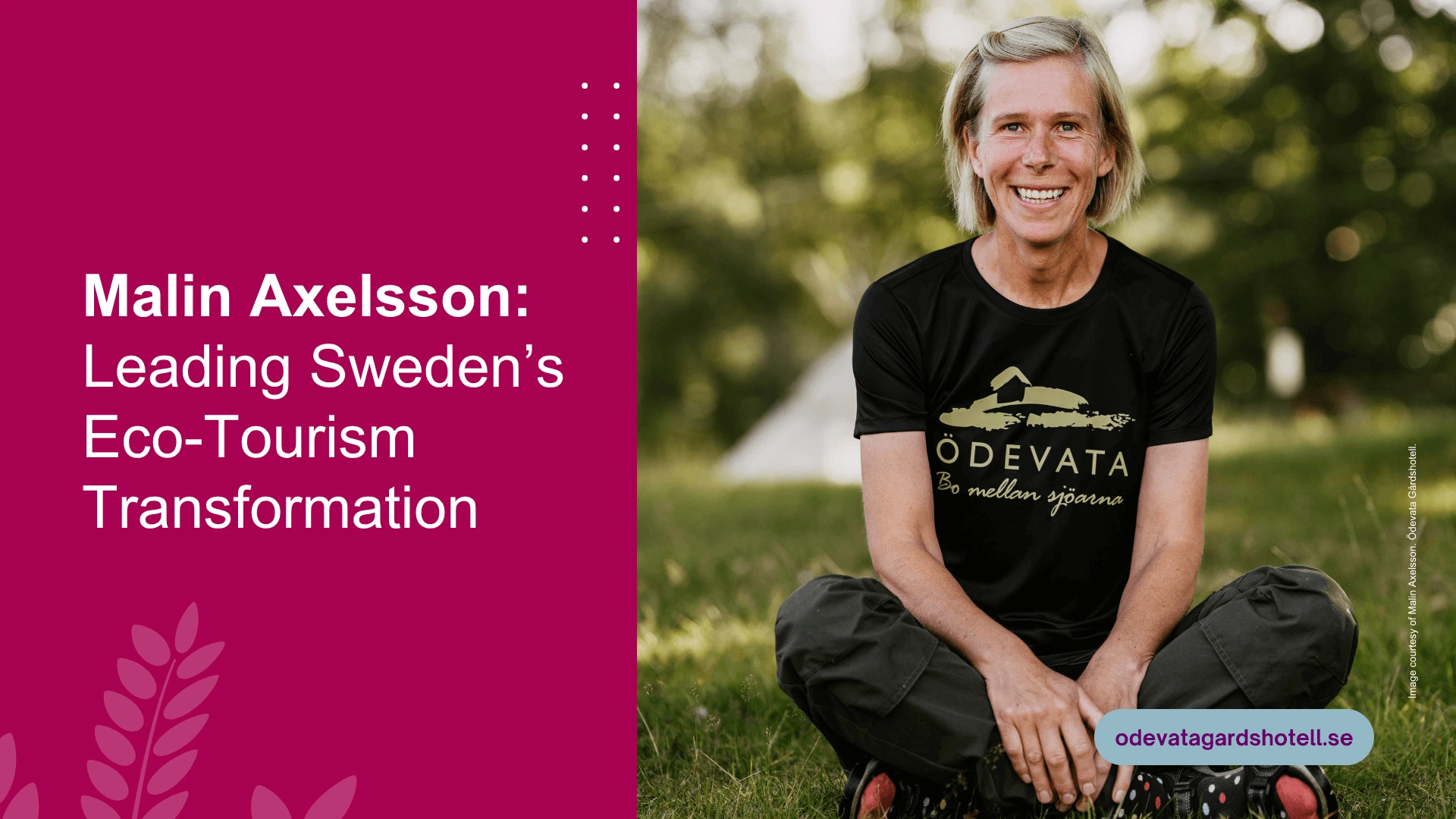Tucked away in the serene forests of southern Sweden, Ödevata Gårdshotell stands as a living, breathing tribute to transformation. Once an abandoned facility with a layered past—having served as everything from a refugee camp to a penitentiary—this historic site has become a haven of sustainability, innovation, and rural reinvention. At the helm of this inspiring metamorphosis is Malin Axelsson, a woman whose journey is as compelling as the land she now stewards.
With a calm resolve and radiant clarity, Malin greets us amid a backdrop of greenery and glass—the hotel’s “Conservatory of the Future,” where fish swim beneath fruit trees, and tomatoes grow in harmony with tilapia. It’s not just a greenhouse. It’s a bold experiment in aquaponics, fuelled by an unassuming black powder: biochar.
“We wanted to create more than a hotel,” Malin begins. “We wanted to build a place where sustainability isn’t a concept but a way of life—visible, tangible, and replicable.” Alongside her husband, Magnus, Malin bought the dilapidated property in 2005. It was, by all counts, a wild gamble. But for Malin, Ödevata was more than land. It was a blank page.
Rewriting the Rural Narrative
What began as a desire to live closer to nature quickly evolved into a mission to inspire transformation. Her curiosity about sustainability led her to the principles of permaculture, a design philosophy that seeks to harmonise human activity with natural ecosystems. “When I discovered permaculture, it felt like finding the missing puzzle piece,” she reflects. “It gave me a framework to design not just our garden but our entire lifestyle.”
Today, Ödevata Gårdshotell welcomes around 4,000 guests a year. But for Malin, success isn’t measured in check-ins. It’s in the ripple effects her work creates. At the centre of it all is her passion project: biochar.
“We’ve been talking about biochar for over a decade,” she says with a smile. “At first, people didn’t know what it was. Now, they come to us to see it in action.” Derived from organic waste and used to enrich soil and filter water, biochar is a key component in Ödevata’s circular systems. It’s used in their garden beds, integrated into their aquaponics setup, and even processed on-site through innovative pyrolysis methods.
The results speak for themselves. Visitors not only witness cutting-edge ecological practices—they leave inspired to replicate them. “We’ve become a kind of informal demo centre. People copy what we do, and that’s exactly what we want.”
Redefining Gender and Innovation in Rural Spaces
Despite her pioneering work, Malin is quick to dismiss any narrative that paints her as battling against odds due to her gender. “I’ve been lucky,” she admits. “My husband and I share responsibilities equally—both in the business and at home. But I’m very aware that this isn’t the case for everyone.”
Her involvement with the EU-funded FLIARA project, which aims to amplify women’s innovation in agriculture and rural areas, has deepened her awareness of global disparities. “When you hear that in some countries, daughters still can’t inherit land, it’s shocking,” she says. “FLIARA is vital because it shines a light on these inequalities and helps us connect across borders to change them.”
Growing a Vision, Rooted in Community
Looking ahead, Malin’s vision is clear: to make biochar as commonplace in Sweden as compost bins. “My goal is for every person and every household to produce and use biochar. That’s how we create real change—when sustainable practices become part of daily life.”
She sees FLIARA as a powerful ally in that journey. “With this network, I can reach more people, share what we’ve learnt, and help others get started. Innovation grows faster when it’s shared.”
Start Small, Think Big
When asked what advice she would offer to other women dreaming of launching something new in rural contexts, Malin doesn’t hesitate: “Just start. You don’t need to have all the answers. But surround yourself with people who support you. Help others, and you’ll find they’ll help you in return.”
As the sun dips behind the trees of Småland and Ödevata’s quiet lakes mirror the evening sky, Malin smiles. Her work is far from done. But her message is already loud and clear: innovation doesn’t always require high-tech labs or sprawling cities. Sometimes, it just needs a forest, a farm, and a woman brave enough to believe in something better.



